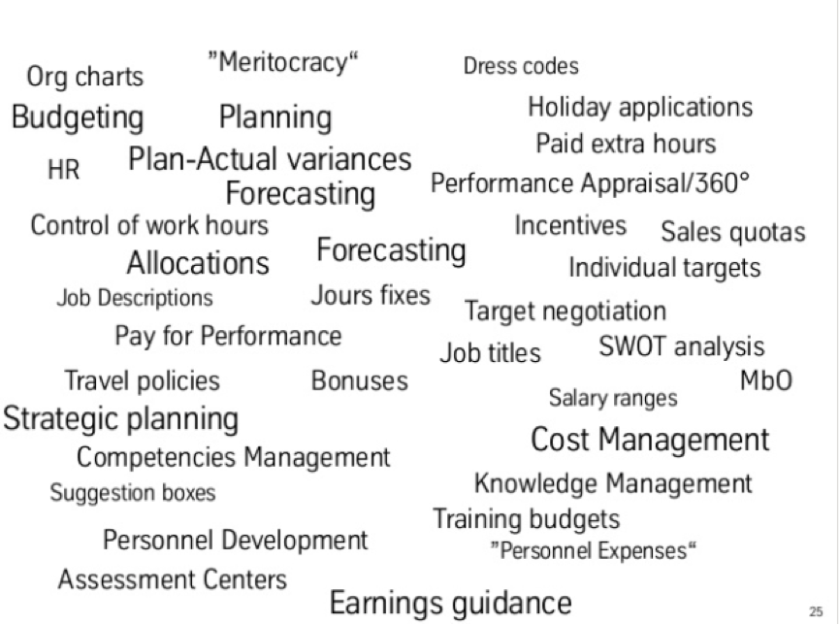There were some interesting posts the last couple of weeks; all indicating that there is something fundamentally wrong with how organisations measure people’s performance.

Petervan artwork – detail of 2016 painting on performing Acryl on Canvas
Some examples:
- Leda Glyptis’ post on the annual appraisal process
- And her subsequent post about the fake nature of innovation processes,
- Céline Schillinger shared Influencers are not influencers anymore, highlighting that the number of followers is not an adequate measure for influence anymore (has never been),
- And of course Thinkers50 Future Thinker Award winner Nilofer Merchant on why the metric matters.
I could add numerous examples of other organisations I met where the people are merely serving the system, not the company or its customers anymore.
Whether it is lean, daily standups, filling the boxes of an archaic ERP system, personal improvement programs, re-orientation processes, competencies management, performance appraisals, or innovation ideations, acceleration and incubation programs.
Niels Pflaeging used to have a slide he called “the bullshit slide”:

Niels Pflaeging “bullshit” slide from 2014
In his recent blog post “Change is like adding milk to coffee”, Niels continues:
Take a step back and you will see that people act consciously and intelligently (overall), to other things than the change itself. They may resist loss of status and power – which is quite intelligent. They may resist injustice, stupidity and being changed. Which is also intelligent. The change may also cause need for learning that is not properly addressed. And these are the things that we have to deal with in change: power structures, status, injustice, consequence, our own stupidity, top-down command-and-control, and learning.
In other words, people don’t resist change, they resist bullshit.
As Niels’ slide shows, the bullshit is omni-present and something structural that needs to be fixed. Only structural change will change the behaviour and culture in your company, all the rest is tactical and innovation theater.
People have good antennas for this; they all feel deeply that they have become self-made self-imposed inmates of the golden cage, forced more than half of their working time doing the wrong thing: filling the forms, the quarterly updates, pushing up and watering down information and ideas upwards the hierarchy and doing nothing else but complying with the organisations’ processes. We are getting audited you know! It’s the process, stupid!
They all share that disjoint between one’s personal expectations of success and impact and corporate or even individual metrics.
I recently had a catch-up call with a friend in the Bay Area, and she was worried she’d become too conservative, she was staying too long with one company (18 months now, 2 years in a job seems to be a career in Silicon Valley…), and worrying all the time whether she was making the most significant impact.
We seem to have been brainwashed that our happiness, fulfilment or whatever you want to call this nirvana state is all about “realising your full potential”, some decades ago the mantra of one of the big tech companies.
I think this is exhausting. You will never reach your full potential and you will always be out for the next big thing. It will never stop. You will never be satisfied.
IMO, maximum impact is the wrong metric. We have to get rid of (comparative) scores in general: they are not real anyway – always ready to trick or comply with the system – and they are always about ticking the boxes about past performance. They don’t add value, at best the measure past value.
We need something that measures our individual progress – individual as opposed to comparing with others. Measuring our progress in building new, future capabilities. Measuring future value potential. Am I better at this than last month? Have I learned something new this week? Etc.
Scores are after the fact. They are confabulating. They are past-performance indicators.

Petervan artwork – Left overs of tape cutting – Feb 2017
We need some future capabilities indicators, showing our own individual continuous learning and cultivation of new skills. Our capacity to making-the-right-cut for the future.
Haydn Shaughnessy once coined the term KCI – Key Capability Indicators. I liked that a lot. At that time, the term was in the context of organisational innovation indicators. I wonder what individual learning indicators would look like.


The link to my article does not seem to be working!
Sorry for that, Niels. Should be corrected now
Hi Peter, I hope you are well. I always liked your blog and writing, and still check in from time to time for an interesting read.
Re: “I wonder what individual learning indicators would look like.” after years of introspection, I’ve got close to answering that for myself. The following is a core slide taken from my personal services company, very light business plan…
https://drive.google.com/open?id=1m75OiLKVLxnYj-vJ_i6y76sdYXcn6Owr
I no longer make an attempt to set targets, ROI, sales etc. My view is, the closer I match the working conditions to my own personal strengths, weaknesses, desires and innate search for growth and meaning, the better the outcomes will be… almost the opposite to conventional business thinking
I hope that’s useful 🙂
Reblogged this on DenkanStoos Hamburg (Stoos-Satellite).
GOOD QUESTION >> I wonder what individual learning indicators would look like.